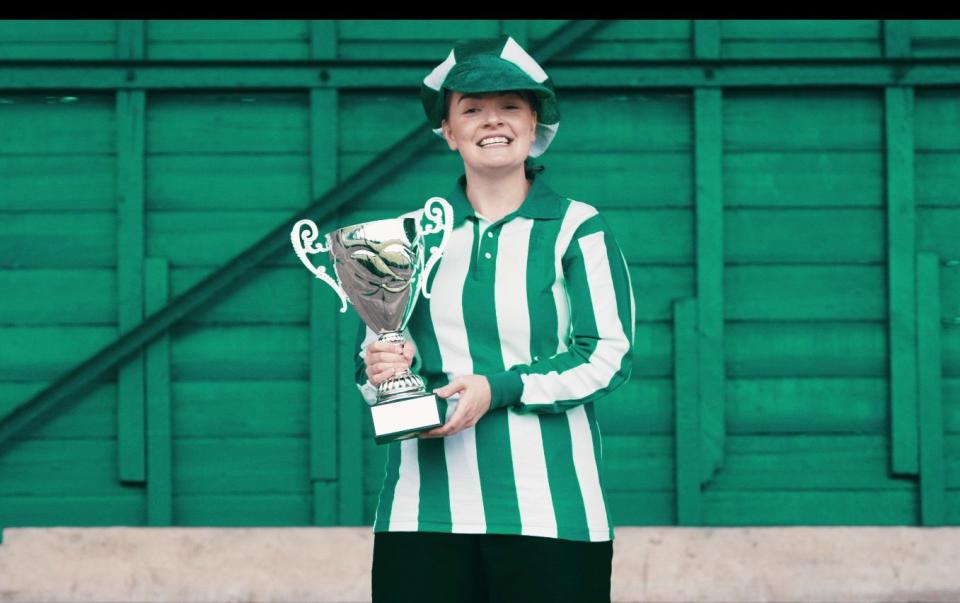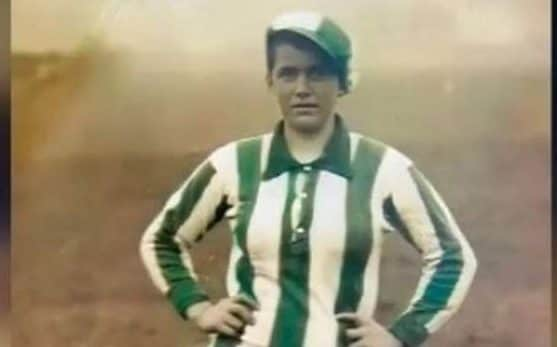You may not have heard of Bella Reay, but she is the most prolific goalscorer in the long and distinguished history of football in the North East, with a remarkable record of 133 goals in just 30 appearances for Blyth Spartans.
The goal-scoring skills of Jackie Milburn and Alan Shearer have been celebrated for generations, but Reay’s achievements have been largely forgotten; The simple reason was that she was a woman who was supposedly playing a man’s game.
Wor Bella, a play written by Ed Waugh and staged in Clapham this month and then at Newcastle Theater Royal, aims to change that.
This is much more than the story of a young girl rising to local stardom thanks to her stunning scoring stats. It also sheds light on a sordid period in FA history, football and politics, when frightened men in suits trampled women’s rights in the post-war world.


Women played a significant role in the First World War, with over 800,000 Munitions brought into factories to keep industrial machinery running, and with the firing of front-line guns, women returned to their former roles in society when peace was broken. went out and the male workforce came home.
“This is an era of English football that has been erased from history,” says Waugh. “I got into this job because I read a book by Patrick Brennan about women’s football in the North East during the First World War. It opened my eyes to the fact that so much had been said about North West women (such as Lily Parr) who were credited with pioneering women’s football in the First World War and the 1920s.
“They deserve everything, don’t get me wrong. But Patrick’s book highlights that women’s football in the North East was at the forefront because our first match was played in Wallsend in February 1917. The Blyth Spartans women’s team was founded in July 1917 and played its first match in August of the same year.
The public still had a huge appetite for watching the national game during the war, and women’s football filled this gap. It also helped raise money for wartime charities.
“The reason women started playing football was the carnage on the battlefields of Europe,” says Waugh. “Nearly one million men, British and Commonwealth soldiers, were either killed, maimed or wounded within a few months; This led to conscription in 1916.
“Men have been called out and women have stepped into their roles in the workplace. This was a war economy, it could be anything from shipbuilding to armament.
“These women spontaneously started playing football at lunch time, which we call North East feed time. Since men’s football was banned in 1915, there was a huge gap in those who wanted to watch football.
“The war was supposed to end before Christmas 1914 but this did not happen, yet the Government had not taken any provision for the people who had lost men fighting in the war; orphaned children, the sick, the injured, widows. People started raising money to help themselves in cinemas and theaters, but these women’s plays initially started raising money for these charities.”


Born in the Northumberland seaside town of Blyth in 1900, Reay was still a teenager when he joined the Spartans and ended their lone season without losing a match and also winning a cup final. Waugh came across him while trying to write a play telling the story of another player who had appeared in the Ordnance Cup final in 1918.
He says: “The top two teams, Bolckow Vaughan and Blyth Spartans, met in the final at St James’ Park in March. It ended in a 0-0 draw in front of 18,000 spectators. The replay six weeks later took place at Ayresome Park in Middlesbrough and saw Blyth Spartans win 5-0 in front of a crowd of 22,000. Bella Reay scored a hat-trick.
“It wasn’t actually the player of the match that went to Mary Lyons. At just 15 years old, he was the youngest player to play for England. Originally the idea was to make a play about her but the club historian at Blyth gave me all the records and Bella was the obvious person to write about; “133 goals were scored in 30 matches in 14 months.”
Women’s football was banned in England until 1971
His time in the spotlight was brief. Reay was one of the country’s best footballers in 1918 but three years later, along with all other female players, she was banned from playing football; This law would remain in effect until 1971.
“Football was caught up in wider change after the war,” says Waugh. “These men who ran the game were afraid of the rise of women’s football and they were afraid it would weaken them.
“Moreover, the mines nationalized during the war were returned to the coal owners. They had made a lot of money during the war, but they told the miners that they would have to take a 40 percent pay cut when the war ended. This was April 1921.
“Women’s football was banned on 5 December 1921. It was a shame. This is a shameful part of FA history. The game is not just about football, it is also about women’s rights. These women who saved the war effort were not even allowed to vote. The women who helped save the country could not vote until 1928. After the war, women were cast aside; football was a symbol of the desire to return women to their ‘rightful place’ of having children and caring for men. Women like Bella were forgotten and pushed aside. That’s why I wanted to tell this story.”
Wor Bella will perform at the Bread & Roses Theater in Clapham on 22-24 April and at Newcastle Theater Royal on 27-28 April.